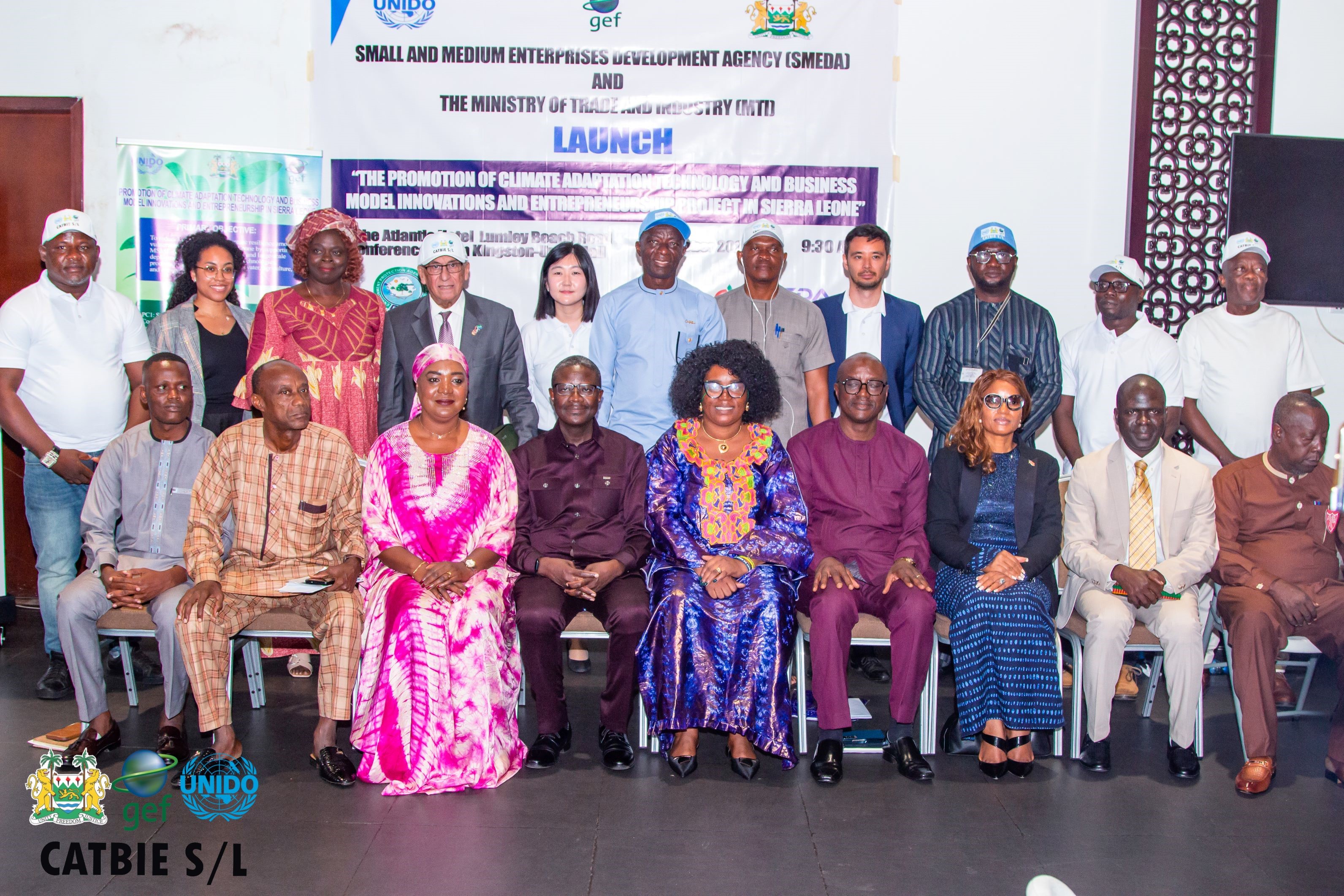AYV News, October 10, 2024
The Government of Sierra Leone, in partnership with the United Nations Industrial Development Organization (UNIDO) and the Global Environment Facility (GEF), has launched a transformative initiative to enhance climate resilience through innovation and entrepreneurship in water, agriculture and energy sectors. The “Promotion of climate adaptation technology and business model innovations and entrepreneurship in Sierra Leone (CATBIE)” project will focus on unlocking the ingenuity and creativity of the private sector to deliver solutions that will help communities to cope with the impacts of a changing climate.
“Sierra Leone is highly vulnerable to the effects of climate change. Through this project, UNIDO will help farmers and businesses across the country gain access to innovative climate adaptation technologies and solutions. For example, the project will provide cold storage facilities for farmers’ markets, make solar freezers and solar water pumps available on a large scale, and provide farmers with automated climate information to enable them to plan and adapt. This initiative will not only increase resilience to climate change but also drive sustainable economic and industrial development in the country”, said Gerd Müller, Director General of the United Nations Industrial Development Organization.
The project will promote the engagement of the private sector in developing and deploying solutions that reduce vulnerability and increase the resilience of vulnerable communities to climate change. Following UNIDO’s systematic innovation approach, it will foster change by helping micro-, small-, and medium-sized enterprises (MSMEs) to develop innovative technologies and solutions, creating innovative financing instruments for MSMES and users to access the solutions, and developing innovative policies and regulations to stimulate innovation on climate adaptation.
“We are dedicated to developing an inter-ministerial coordination mechanism to promote the integration of adaptation and resilience by actively engaging MSMEs in the key sectors of water, energy, and agriculture. Additionally, the creation of a national adaptation innovation platform will foster and support innovative adaptation solutions across the country,” said David Moinina Sengeh, the Chief Minister of Sierra Leone.
Supported by the Government of Sierra Leone, the CATBIE project is financed by the Global Environment Facility (GEF), implemented by the United Nations Industrial Development Organization (UNIDO) and executed by the Small and Medium Enterprises Development Agency (SMEDA).
GEF CEO and Chairperson Carlos Manuel Rodríguez highlighted that innovative financing is essential to deploying the climate adaptation technologies and solutions needed to build resilience at speed and at scale. “The partnership between Sierra Leone and the GEF-managed Least Developed Countries Fund is vital in addressing the challenges posed by climate change,” Rodríguez said. “Together, we are strengthening resilience, advancing sustainable development, and ensuring that vulnerable communities are better prepared to face the increasing impacts of our changing climate.”
“This new project is crucial in helping our enterprises. We will support the project by building strong partnerships and mobilizing resources so more small businesses can access climate adaptation technologies and business model innovations,” said Kandeh Yumkella, Chairman of the Presidential Initiative on Climate Change, Renewable Energy and Food Security.
By the end of the project, the project aims to raise $25 million in co-finance, create 200 new jobs, and help 250,000 vulnerable people, of which at least 40% will be women and 20% youth. The project will also establish a national adaptation innovation platform, support about 50 MSMEs, and provide training to over 6,200 individuals.
The launch event in Freetown was attended by a range of stakeholders, including representatives from the Office of the President, the Environmental Protection Agency, the Ministry of Trade and Industry, the Ministry of Energy, the Ministry of Water Resources and Sanitation, the Ministry of Agriculture and Food Security, and the Ministry of Environment and Climate Change, as well as the business sector.
The Global Environment Facility (GEF) is a multilateral family of funds dedicated to confronting biodiversity loss, climate change, and pollution, and supporting land and ocean health. Its financing enables developing countries to address complex challenges and work towards international environmental goals.
The partnership includes 186 member governments as well as civil society, Indigenous Peoples, women, and youth, with a focus on integration and inclusivity. Over the past three decades, the GEF has provided more than $25 billion in financing and mobilized $145 billion for country-driven priority projects.

